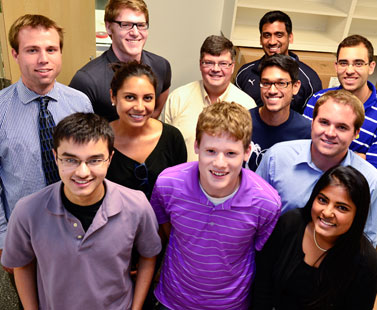USF Business of Medicine Boot Camp creates a bang
Intensive program inspires students to explore business-entrepreneurial aspects of health care
What does an exploding whale have to do with the practice of medicine?
More than you might think. Identifying all the potential problems that could arise in getting rid of an 8-ton beached whale was actually an exercise in process management and improvement for the 18 USF medical students enrolled in this summer’s Business of Medicine Boot Camp.
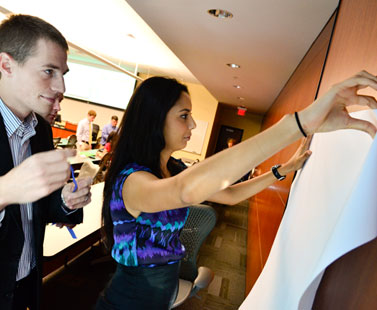
Student Nerissa Moore hangs paper in preparation for a process management mapping exercise at the 2011 USF Business of Medicine Boot Camp.
During a recent weekday class, the students watched an early 1970s video newscast reporting how the state highway department was brought in to dispose of a dead-on-arrival gray whale washed up on the beach of an Oregon coast town. The workers decided on dynamite, figuring that a strategically positioned blast would disintegrate most of the whale and any small remaining pieces would be snatched up by seagulls and other scavengers. (More about the result later.)
College of Business instructor Ronald Satterfield, PhD, MBA, stopped the video before the “solution” was implemented. He led teams of students in an exercise designed to get them to identify and diagram all the relevant steps of the whale blasting project and then to think systematically about what problems might occur. They came up with several: What if the dynamite was improperly packaged or placed? What if the whale’s hide was tougher than expected? What if the explosion scared away scavengers? Were curious bystanders positioned far enough away from the blast site?

College of Business instructor Ronald Satterfield, right, teaches the operations
module of the intensive 8-week summer program.
“I wasn’t sure at first, but it absolutely was a valuable experience that could be applied to medicine,” said student David Graham. “The process of mapping out how something works and pinpointing what could go wrong and why really helps you think creatively about how to fix a potential problem and the need for building in safety backups.”
Like most of his fellow students, Graham arrived at the boot camp with little business background.
Now in its second year, the intensive eight-week Business of Medicine Boot Camp is offered to medical students in the summer between their first and second years. Taught by faculty from the College of Business and USF Health, students get a comprehensive look at the business skills needed to be successful physician leaders and innovators who can invent new ways of diagnosing and treating diseases, ensure healthier communities and shape the system in which they are central players. They are introduced to organizational management, health care economics, finance, marketing, health care information technology and systems engineering, negotiation, and innovation and entrepreneurship – topics not typically covered in medical school.

After spending their initial year as medical students steeped mainly in the hard sciences, they are now wrapping their minds around new terminology and concepts. DRGs instead of DNA. Gross income instead of gross anatomy. Six Sigma instead of signal transduction.
They experience the give and take of building consensus and resolving conflicts as they work in groups to accomplish tasks more effectively. Every student gets the opportunity to be project leader for one team activity or another. They’re encouraged to problem solve and proactively look for opportunities to improve a process, service or product.
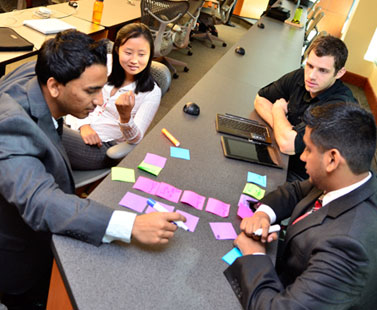
Team work, resolving conflict and building consensus are an integral part
of the boot camp.
“I felt so dumb the first week. It’s as though we were taught in four days what would normally take four weeks,” said Nerissa Moore, who blogged about surviving the first few weeks of Business of Medicine Boot Camp, otherwise known as the BOMB. “I’m challenging a different part of my brain than the part exercised in medical school – it’s difficult, but I love it. We learn life skills that are needed not only to be a successful doctor, but to be an accountable member of society.”
Connecting the Practice and Business of Health Care
The Business of Medicine Boot Camp was spearheaded in 2010 by William G. Marshall, Jr., MD, MBA, associate professor of pyschiatry and neurosciences with a joint appointment in surgery, and Courtney Bovee, who recently graduated from the college and had majored in business as an undergraduate.
Before then, USF medical students could (and still can) pick a scholarly concentration in business to work around their demanding medical curriculum, but, Dr. Marshall said, it wasn’t enough. So when Stephen Klasko, MD, MDA, CEO for USF Health and dean of the College of Medicine asked Dr. Marshall what he needed, he said, “the number one thing is more time, because most of these students know nothing about business… It’s totally foreign to them.”
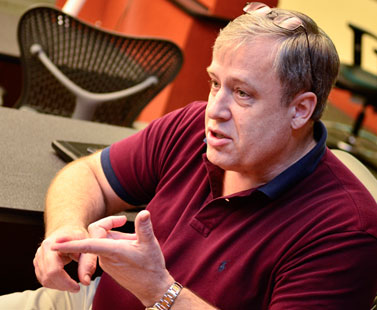
USF Health’s Dr. William G. Marshall, Jr., an assistant director of the USF Center for Entrepreneurship, teaches the medical students strategies for innovation and entrepreneurship.
With the enthusiastic support of Dr. Klasko and Dr. Frank Fernandez, chair of the Department of Psychiatry and Neurosciences, Dr. Marshall enlisted the help of several faculty from the College of Business who taught in USF’s Physician MBA Program. Faculty from the Colleges of Public Health and Engineering also teach at the boot camp. The program started with nine students, which doubled to 18 this summer with the help of funding from corporate and private donors.
“That tells me students recognize the value of this program,” said Dr. Marshall, who expects an even bigger turnout next year. “It’s a big commitment and they could be doing many other things with their time over the summer, like research, service or traveling.”


When you ask USF medical students why they wanted to spend their summer vacation in the boot camp, they express similar sentiments. Virtually all practicing physicians they’ve spoken with say they wish they learned more about the business aspects of medicine. The students recognize they’ll need more than clinical expertise in the brave new world of health reform; it will take business acumen, leadership and innovation to survive and thrive in an increasingly competitive and complex health care system.
That’s something that resonates with Dr. Klasko, who earned his MBA from the Wharton School at the University of Pennsylvania. A survey just completed by the USF College of Medicine indicated that 60 percent of physicians practicing three years or less feel that they did not learn what they most needed in practice.
“They learned biochemistry, anatomy, cardiology and internal medicine,” Dr. Klasko said. “But many did not learn how to creatively embrace change, effectively communicate or collaboratively negotiate. They learned to ‘become a doctor,’ but not how to make a patient happy, be a leader (or a good follower), be an individual who contributes positively to an organization or runs an effective meeting.”
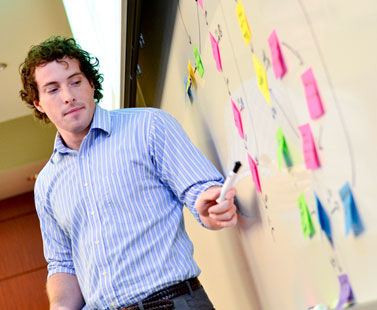
Dr. Marshall, who ran his own cardiac surgery practice for 25 years, teaches the boot camp students strategies for innovation and entrepreneurship. He encourages the aspiring young physicians to seek new solutions to improve healthcare access, safety, quality, satisfaction and affordability.
“The fifth, affordability, is not the least of these,” he said. “No matter how much an individual or group wants to help people, they need the resources to make that happen. If you can’t deliver health care effectively and efficiently…. if you’re having trouble keeping the doors open and paying for electricity to run ventilators in the ICU and the instruments in the operating room, you can’t take care of patients.”
More than ever before, these students understand that the practice and business of medicine are intrinsically linked.

“The boot camp helped me become much more aware of all the external factors that affect patient care, such as government regulations, health insurance and how the cost of care is connected to its quality and safety,” said USF medical student Corey Reeves, who will graduate in 2013 and participated in the inaugural program last year.
Reeves, along with classmate Matt Tufts and Dr. Marshall, presented a paper in June on the Business of Medicine Boot Camp in Sweden. “It’s a new way of thinking about the environment in which we’ll be delivering health care,” Tufts said.
Building a New BRIDGE
Remember that exploding whale video? Well, the boot camp students found out that many potential consequences they mapped out did in fact happen.
At the end of class, they watched the news video finale in which bystanders ran for cover because the exploding pieces of whale blubber were larger than expected. One big chunk even damaged the roof of car parked more than a quarter mile from the blast site. And the explosion scared away seagulls and other scavengers, so much of the remaining whale had to be buried.
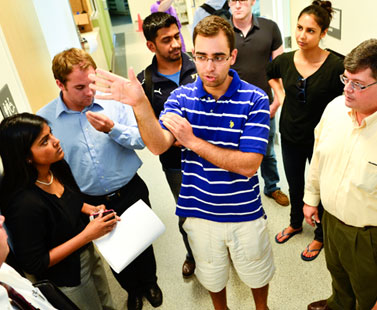
The students, with Dr. Satterfield, toured the Morsani Center space where the BRIDGE Clinic is expected to move later this summer. Their boot camp capstone project involves writing a business plan for the clinic.
The video-inspired classroom activity in process management, along with other lessons learned in the boot camp, have been applied to the students’ capstone project – developing a business plan for the BRIDGE Clinic. The free, student-run clinic will move later this summer from the University Area Community Health Center to the USF Health Morsani Center for Advanced Healthcare.
Since June, different student groups have worked together to reassess how patient flow will be managed, determine roles and responsibilities of the clinic’s patient care and operations coordinators, and plan for introducing nursing, and eventually pharmacy, students into a staffing mix that now includes medical, physical therapy and social work students. They are formulating a budget and beginning to work out the logistics of transitioning medical records from a paper to electronic system. How to best attract donors for the clinic and market the new location to patients is also part of the project.
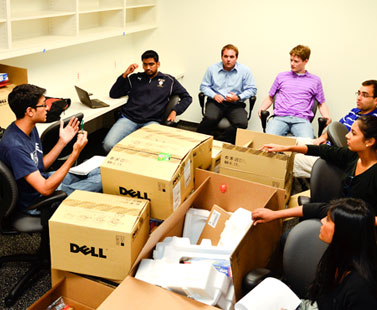
“It’s a big change, and they’re essentially starting from scratch,” said Dr. Satterfield, who is consulting with students on the business plan. “The goal is to use resources to their best advantage. Doing that will help improve the clinical learning experience for the students who volunteer at BRIDGE and increase the number of patients they can effectively handle, so they can deliver more care for the greatest good.”
Jason Patel is a member of the boot camp operations team integrating the finance, management, marketing and other pieces of the project into one comprehensive plan.


Student Jason Patel leads a discussion about logistics for the BRIDGE Clinic transition during an operations team meeting.
“We’ve drawn on many of the techniques we talked about in our negotiations class,” Patel said. “like the importance of patience and effective communication, framing an issue in a neutral way, putting ourselves in the place of the BRIDGE student directors and faculty mentors and getting everyone’s buy-in before making a change in the system. You find that you can’t expect everyone to jump on board just because you think something is a good idea.”
In addition to writing the BRIDGE business plan, some boot camp students are working on a marketing plan that will position the USF Health Center for Advanced Medical Learning and Simulation (CAMLS) as a brand and attract physicians across the country for advanced education and training at the state-of-the-art facility. The students are consulting with Paul Solomon, PhD, professor of marketing, and Deborah Sutherland, PhD, CEO of CAMLS.

Getting Noticed
Dr. Marshall says to the best of his knowledge, USF Business of Medicine Boot Camp is the first such program in the country. It continues to attract attention nationally and internationally.
In addition to a recent presentation in Stockholm, Sweden, at the annual meeting of the International Council on Small Businesses, the boot camp program has been shared with audiences at the Florida Medical Association annual meeting, the Association of American Medical Colleges national meeting in Washington, DC, and a conference of the U.S. Association for Small Business and Entrepreneurship.

L to R: Corey Reeves, Dr. Marshall, and Matthew Tufts recently presented a USF paper on healthcare innovation and entrepreneurship for medical students at a business conference in Sweden. Reeves and Tufts were in last year’s first boot camp program.
Completing the boot camp won’t turn medical students into CEOs, but Dr. Marshall hopes the graduates leave with a greater appreciation that today’s physicians need more knowledge and insight about the business of medicine and the health care industry.
“Every aspect of health care today has business applications and implications,” said USF’s Dr. Solomon, “The challenge for the future is to prepare physicians who can be good business managers and leaders as well as great practitioners of medicine.”
Story by Anne DeLotto Baier, and photos by Eric Younghans, USF Health Communications
